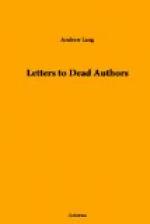So we fare in England, but somewhat better north of the Tweed, where trout are less wary, but for the most part small, except in the extreme rough north, among horrid hills and lakes. Thither, Master, as methinks you may remember, went Richard Franck, that called himself Philanthropus, and was, as it were, the Columbus of anglers, discovering for them a new Hyperborean world. But Franck, doubtless, is now an angler in the Lake of Darkness, with Nero and other tyrants, for he followed after Cromwell, the man of blood, in the old riding days. How wickedly doth Franck boast of that leader of the giddy multitude, ’when they raged, and became restless to find out misery for themselves and others, and the rabble would herd themselves together,’ as you said, ‘and endeavour to govern and act in spite of authority.’ So you wrote; and what said Franck, that recreant angler? Doth he not praise ’Ireton, Vane, Nevill, and Martin, and the most renowned, valorous, and victorious conqueror, Oliver Cromwell.’ Natheless, with all his sins on his head, this Franck discovered Scotland for anglers, and my heart turns to him when he praises ‘the glittering and resolute streams of Tweed.’
In those wilds of Assynt and Loch Rannoch, Father, we, thy followers, may yet take trout, and forget the evils of the times. But, to be done with Franck, how harshly he speaks of thee and thy book. ’For you may dedicate your opinion to what scribbling putationer you please; the Compleat Angler if you will, who tells you of a tedious fly story, extravagantly collected from antiquated authors, such as Gesner and Dubravius.’ Again, he speaks of ’Isaac Walton, whose authority to me seems alike authentick, as is the general opinion of the vulgar prophet,’ &c.
Certain I am that Franck, if a better angler than thou, was a worse man, who, writing his ‘Dialogues Piscatorial’ or ‘Northern Memoirs’ five years after the world welcomed thy ‘Compleat Angler,’ was jealous of thy favour with the people, and, may be, hated thee for thy loyalty and sound faith. But, Master, like a peaceful man avoiding contention, thou didst never answer this blustering Franck, but wentest quietly about thy quiet Lea, and left him his roaring Brora and windy Assynt. How could this noisy man know thee—and know thee he did, having argued with thee in Stafford—and not love Isaak Walton? A pedant angler, I call him, a plaguy angler, so let him huff away, and turn we to thee and to thy sweet charm in fishing for men.
How often, studying in thy book, have I hummed to myself that of Horace—
Laudis amore tumes? Sunt certa
piacula quae te
Ter pure lecto poterunt recreare
libello.




